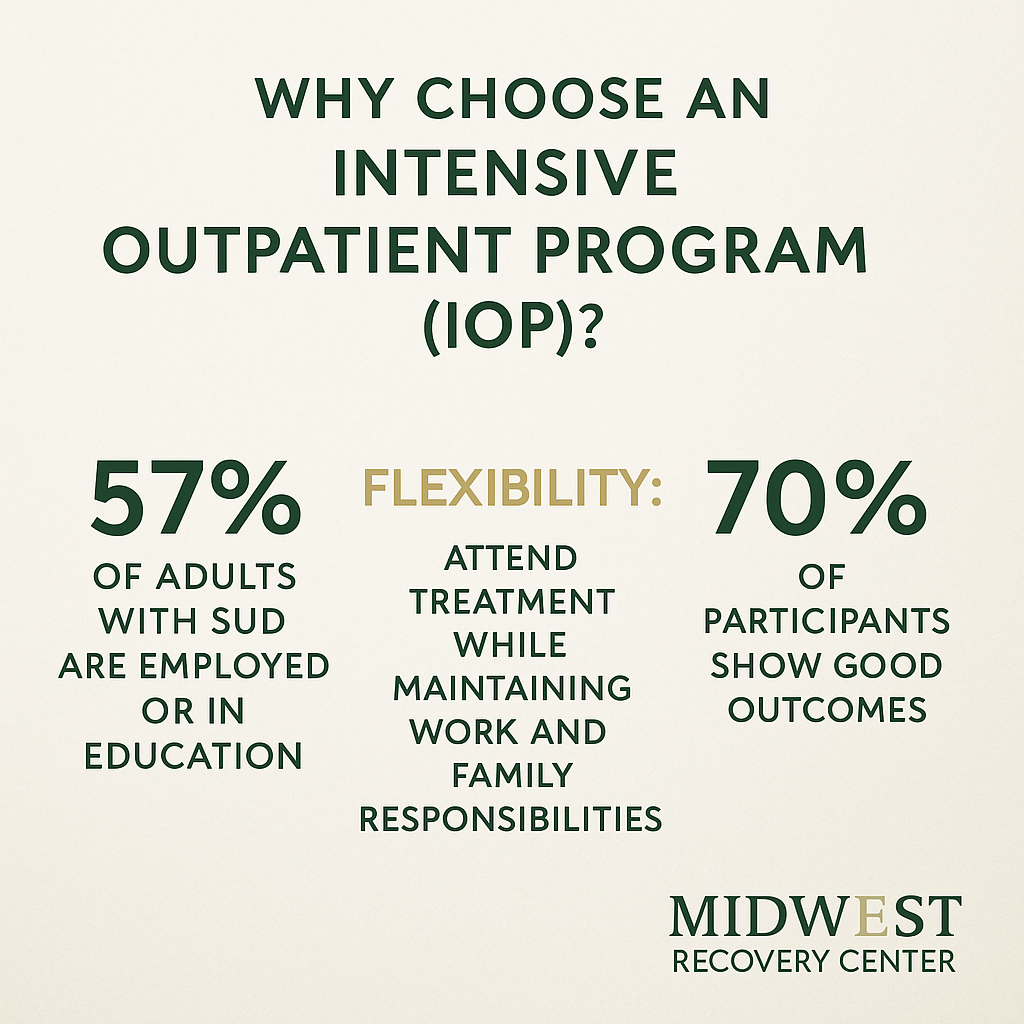There’s a version of addiction that doesn’t look like the movies. No DUIs. No lost jobs. No public breakdowns. Just a quiet, constant tug-of-war: balancing a career, a family, and a private habit that’s taken on a life of its own. If that sounds familiar, you’re not alone. And you’re not broken. Increasingly, people who are high-functioning on the outside—but struggling on the inside—are finding sustainable recovery through intensive outpatient programs (IOPs).
The Hidden Struggle of High-Functioning Addiction
You might be the one who never misses a deadline. The parent who never skips a soccer game. The person who’s always “on.” But addiction doesn’t care about appearances. For many high-functioning individuals, addiction takes root in the quiet moments—after the kids are in bed, after the emails are sent, after the world thinks you’ve won the day.
That’s the exhausting truth: you’re doing everything “right,” and it’s still not enough to quiet the cravings or stop the cycle. Intensive outpatient programs recognize this reality—and offer a way out without tearing down the life you’ve built.
Why Intensive Outpatient Programs Work for Busy Lives
One of the biggest barriers to seeking help is the fear of stepping away from your life completely. Residential rehab feels impossible when you have a career, family, and community obligations. That’s where IOP bridges the gap.
At Midwest Recovery Center in Toledo, intensive outpatient treatment means:
- Day or evening sessions that fit around your work schedule.
- Therapy that targets your specific stressors—whether it’s work-related anxiety, relationship strain, or emotional burnout.
- A real-world approach to recovery, teaching you to navigate triggers in your actual environment—not a controlled bubble.
It’s support that doesn’t ask you to disappear. It’s accountability without upheaval.
You Don’t Have to Wait for a Breakdown
The myth of “rock bottom” has kept too many people stuck for too long. You don’t have to wait for a catastrophe to get help. You don’t have to wait for relationships to fall apart or health scares to appear. IOP is designed for people who are done playing chicken with their well-being. You can be high-functioning and hurting. You can be successful and struggling. You can decide to change simply because you’re tired of feeling like a fraud.
What Happens Inside an Intensive Outpatient Program?
If you’ve never done treatment before—or had a bad experience with it—you might be wondering what actually happens in an IOP setting. At Midwest Recovery Center, you’ll experience:
- Group therapy sessions where real conversations happen, without shame or judgment.
- Individual therapy tailored to your goals and the root causes of your substance use.
- Evidence-based therapies like cognitive behavioral therapy (CBT) and motivational interviewing to build new coping skills.
- Holistic options like mindfulness and life-skills coaching to strengthen your recovery from every angle.
- Ongoing support that extends beyond treatment, so you’re not left on your own the day after graduation.
Every session is geared toward one thing: helping you stay functional, fulfilled, and free—without sacrificing your responsibilities.

Building Recovery Skills That Actually Last
White-knuckling sobriety doesn’t work—especially when you’re juggling work and home life. That’s why IOP focuses on sustainable recovery skills, not short-term fixes. You’ll learn:
- How to identify and manage high-risk situations.
- Tools to handle stress without reaching for a drink or pill.
- Strategies to rebuild strained relationships without guilt-based apologies.
- Techniques to shift from survival mode to actually enjoying your life again.
The goal isn’t just sobriety—it’s creating a version of your life that you don’t want to escape from.
Recovery in Toledo, Ohio—Close to Home, Close to Real Life
Getting help locally offers a different kind of strength. When you attend Midwest Recovery Center’s intensive outpatient program in Toledo, you’re learning how to stay sober in your actual environment. You’ll practice new habits around your routines, your community, your life.
Recovery is more than just stopping a substance—it’s reclaiming your mornings, your focus, and your peace of mind. Midwest Recovery’s team understands the unique pressures of being high-functioning and struggling at the same time. Here, you won’t be shamed for how you coped—only supported in building something better.
Common Questions About Intensive Outpatient Programs
Who is a good fit for an intensive outpatient program?
IOP is ideal for people who need structured support but don’t require 24/7 supervision. It’s a good fit if you:
- Are high-functioning but privately struggling with substance use.
- Have completed inpatient treatment and need step-down care.
- Need flexible scheduling to balance work, family, and recovery.
How long do intensive outpatient programs last?
Programs typically last 8 to 12 weeks, with 9–12 hours of therapy per week, though the exact length varies based on your needs and progress. The structure is designed to provide intensive support while still allowing you to live at home and maintain your daily responsibilities.
Is IOP as effective as residential treatment?
For many high-functioning individuals, yes. IOP is effective because it offers real-world application of recovery skills. You don’t just learn sobriety in a vacuum—you practice it in your daily life with professional support just a call or visit away.
What if I can’t attend during the day?
Midwest Recovery Center offers flexible scheduling, including evening sessions, so you can participate without sacrificing your career or other important commitments.
How do I get started with an IOP in Toledo?
Starting is simple. You can call Midwest Recovery Center at (888) 657-0858 to speak with an admissions counselor who understands where you’re coming from. There’s no obligation—just a conversation about your options and what might help you feel better.
📞 You don’t have to hit bottom to get help.
Call (888) 657-0858 or visit Midwest Recovery Center’s intensive outpatient program in Toledo to see how recovery can fit into your life—without blowing it up. Relief is closer than you think.


























